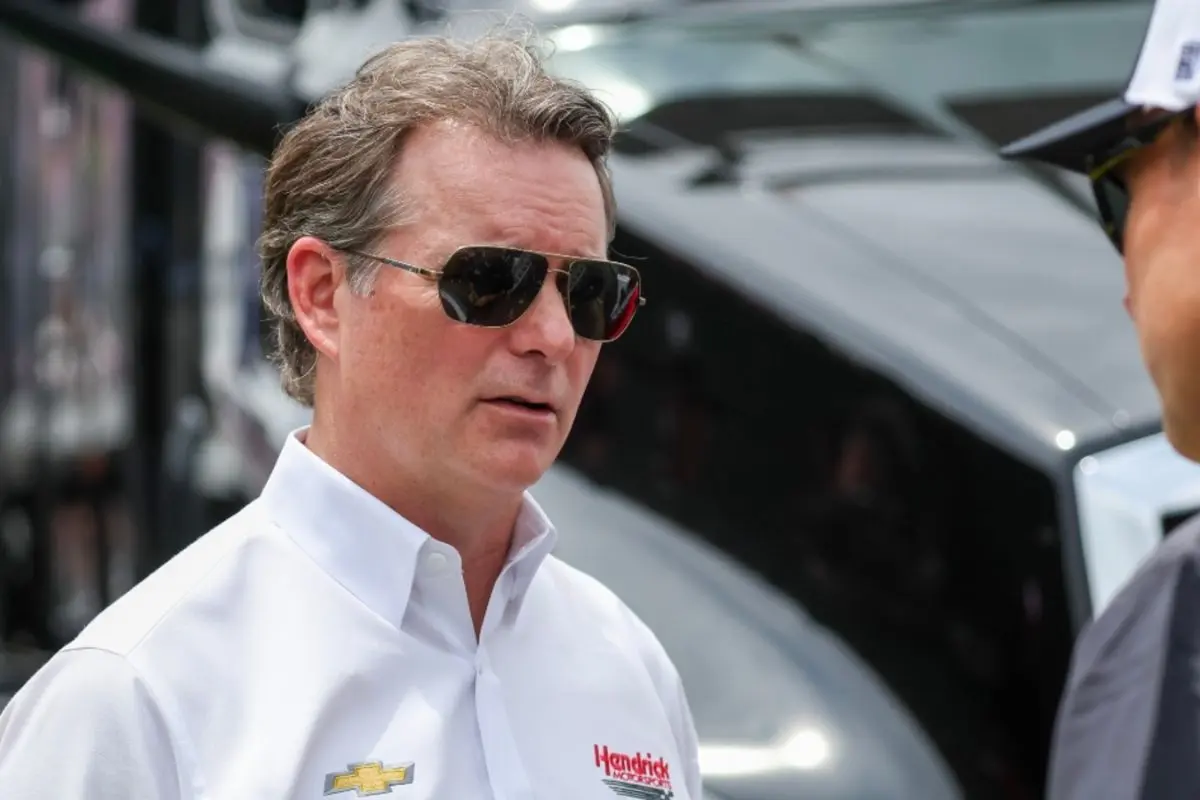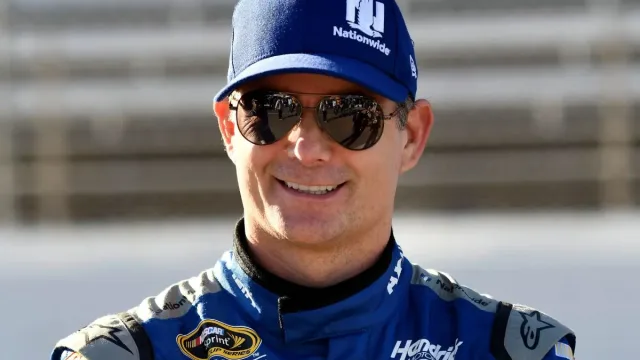Jeff Gordon opens up about his Indy 500 ambitions from his admiration of icons like AJ Foyt. However, early rejections from IndyCar steered him towards NASCAR, where he flourished. His five Brickyard 400 victories partially fulfilled his Indy desires. Amidst such a rich legacy, one might wonder what could have been had those early career opportunities panned out.
Key Highlights
- Jeff Gordon admired IndyCar legends and dreamt of winning the Indy 500 since his early career.
- Multiple rejections from IndyCar teams led Gordon to pursue a successful NASCAR career instead.
- Gordon expressed respect for the challenges of the IndyCar series in a 2016 interview.
- Brickyard 400 victories partially fulfilled Gordon’s desire to succeed at Indianapolis Motor Speedway.
- Gordon’s shift to NASCAR was driven by opportunity and was solidified by his remarkable achievements.
Jeff Gordon’s Indy 500 Dream
Jeff Gordon’s illustrious career in NASCAR cemented his status as one of the sport’s all-time greats, yet the legendary driver harbored an unfulfilled aspiration that lay beyond the stock car domain: racing in the iconic Indy 500.
Despite his monumental success in NASCAR, which included four Cup Series championships, the allure of the Indy 500 lingered as a reflection of his early racing dreams and inspirations.
Gordon, even as a young driver, idolized IndyCar legends like AJ Foyt, Rick Mears, and Johnny Rutherford. His admiration for these champions fueled his ambition to compete in the “Greatest Spectacle of Racing.”
However, the path to IndyCar was fraught with obstacles. Multiple rejections from teams thwarted his initial endeavors, ultimately redirecting his course toward NASCAR. This pivot, while fruitful, left a lingering “what if?”—a question that haunted the periphery of his accomplished career.
In an honest 2016 interview with Sports Illustrated, Gordon reflected on this unfulfilled dream, acknowledging the respect and reverence he held for the IndyCar series.
“It certainly was at one time. You know I love that race. I wanted to be… my heroes growing up were Indy 500 champions like AJ Foyt, Rick Mears, and Johnny Rutherford. So I thought maybe, you know, that was on the rise for me, but no, it’s not now. They got fulfilled… so many of my goals through NASCAR racing in Indianapolis and winning the Brickyard 400. But I would like to drive some other types of race cars. So, I’m not retired completely, but it’s just going to be something that makes sense and is interesting to me.”
“IndyCars, I just don’t… you know, I have too much respect for those cars and what they are capable of doing and how difficult (it) would be without having the proper amount of time in the car.” – Jeff Gordon
He recognized the formidable challenge posed by these machines and the requisite time needed to master them, admitting that without the proper preparation, pursuing this ambition would not be feasible.

While his desires were partially satiated by victories at the Brickyard 400, the Indy 500 remained an untouched peak.
Gordon’s story is a reminder that even the most accomplished athletes can possess uncharted dreams, highlighting the unpredictable nature of a racing career and the paths it may take.
Jeff Gordon’s NASCAR Legacy
Gordon’s NASCAR legacy is a tribute to his steadfast resolve and unmatched skill on the racetrack. Racing exclusively for Hendrick Motorsports, Jeff Gordon carved an indelible mark in the annals of NASCAR. His career, punctuated by four championship victories in 1995, 1997, 1998, and 2001, is a confirmation of his dominance and consistency in a sport known for its unpredictability and fierce competition.
Gordon’s ability to maintain peak performance over time is a reflection of his tireless work ethic and exceptional talent. With 93 wins, Gordon ranks as the third-winningest driver in Cup Series history, a feat that highlights his remarkable skill behind the wheel. Each victory was not merely a number but a narrative of tactical insight, patience, and the relentless pursuit of excellence.
His performances redefined what it meant to be a racing champion, setting a benchmark for future generations to aspire to. Significantly, while Gordon’s Indy 500 ambitions remained unfulfilled, his unmatched success at NASCAR’s Brickyard 400 at the Indianapolis Motor Speedway served as a symbolic realization of that dream.
Winning the event a record five times, he illustrated his capability to conquer one of racing’s most iconic tracks, albeit in a different format. Gordon’s career is not just about the statistics but the revolutionary impact he had on the sport. His legacy extends beyond his on-track achievements, influencing the culture of NASCAR and inspiring a new wave of drivers.
Jeff Gordon’s Physical Struggles Leading to Retirement
While Jeff Gordon’s legacy in NASCAR is marked by unmatched achievements and iconic victories, his path was not without considerable challenges, particularly toward the latter part of his career. Despite his illustrious record, Gordon’s physical struggles became an increasingly notable factor, ultimately leading to his decision to retire from professional racing.
Debuting in the NASCAR Cup Series in 1992, Gordon quickly silenced skeptics by clinching the Rookie of the Year title. His career saw a string of successes, including 16 Crown Jewel race wins. However, the rigors of racing began to manifest physically, with Gordon experiencing persistent lower back pain and spasms as early as 2005. By 2010, these issues worsened, compelling him to seek physical therapy and other treatments to manage the pain.
In a frank 2023 interview with Joe Buck, Gordon recounted his struggles, emphasizing the depth of his physical challenges. Despite efforts to mitigate the pain, the relentless demands of racing exacerbated his condition. The wear and tear on his body raised serious concerns about his ability to continue competing at the highest level.
Confronted with the reality of his physical limitations, Gordon had a crucial conversation with Rick Hendrick, owner of Hendrick Motorsports. Gordon’s admission to Hendrick highlighted the severity of his discomfort: “My body is just not doing well. I’m in a lot of pain throughout the race, and every time I get out of the car.”
“I started having some back issues, some lower back pain and spasms and pain in the car… probably even goes back to around 2005 or 2006. But it really started getting bad around 2010 and I started working on it, doing physical therapy and different things.”
“I went to Rick Hendrick and I said, ‘Rick, I don’t know how much longer I’m going to be able to do this. My body is just not doing well. I’m in a lot of pain throughout the race, and every time I get out of the car.” – Jeff Gordon
This realization set the stage for his retirement, as he prioritized his long-term health over the continuation of his racing career.
Jeff Gordon’s Current Role
Stepping into a vital role beyond the driver’s seat, Jeff Gordon has moved into a tactical position as Vice Chairman for Hendrick Motorsports, blending his extensive racing experience with executive leadership. This change marks a notable evolution in Gordon’s career as he shifts from the high-octane demands of racing to the tactical intricacies of team management.
His tenure as a driver at Hendrick Motorsports, where he clinched four NASCAR Cup Series championships, equips him with an unmatched understanding of the competitive landscape, talent development, and the subtleties of team dynamics.
In his capacity as Vice Chairman, Gordon utilizes his deep-seated knowledge of racing to influence key decisions that propel the team forward in a fiercely competitive industry. His role is not merely ceremonial; it is integral to the tactical planning and operational oversight at Hendrick Motorsports.
Gordon’s insights into driver performance, race strategy, and team cohesion are instrumental in shaping the organization’s path. Moreover, his part-ownership stake highlights a vested interest in the long-term success of the team.
It positions him distinctly to drive innovation while preserving the legacy of excellence that Hendrick Motorsports is known for. His involvement extends beyond the track, covering sponsorship negotiations, brand expansion, and fostering relationships within the racing community.
News in Brief: Jeff Gordon Opens Up About His Indy 500 Ambitions
Jeff Gordon’s expedition through the world of racing reveals a tapestry of ambition, achievement, and adaptation. Despite not fulfilling the dream of competing in the Indy 500, Gordon’s legacy in NASCAR remains unmatched, highlighted by numerous victories and accolades.
Physical challenges, however, necessitated a shift in focus, leading to retirement. Currently, Gordon’s involvement in the sport continues in a different capacity, showcasing resilience and a lasting influence on motorsport’s evolving landscape.
ALSO READ: Jeff Gordon Opens Up About Body Aches But His NASCAR Passion Remains Strong




